同位语从句
同位语从句

同位语从句一、同位语1.定义:同位语是句子成分的一种,它位于名词、代词后面,说明它们的性质和情况,它可以由名词、代词、数词、名词性短语或从句充当。
2.同位语的表现形式:1)名词、代词、数词等在句中作同位语。
I lived with my aunt Anna.(名词)He wants to buy a shirt, one that is not expensive but nice.。
(代词)She is the oldest among them six.(数词)2)名词短语、形容词短语、动名词短语、不定式短语作同位语。
Is this your purpose, to avoid being punished? (不定式短语)Professor Smith, a football fan, often watches football games on TV.(名词短语)3)同位语从句在句中作同位语He told me the news that the president had been murdered.(从句)二、同位语从句1.定义:在复合句中充当同位语的从句叫“同位语从句”。
它一般跟在某些抽象名词的后面,用于说明该名词表示的具体内容。
常见的这类名词有news, fact, idea, thought, promise, suggestion, order, 等。
2.引导词|:1)连词:that, whether2)连接副词:when/where/why/how /whenever/wherever/however3)连接代词:what/who/whom/whose/which/whatever/whoever/whomever/whosever/whichever三、同位语从句与定语从句的区别:1.先行词:同位语从句的先行词是抽象名词;定语从句的先行词是具体、抽象名词或代词。
2.3.引导词四、同位语从句常见句型:1)have no idea +同位语从句Sorry, I really have no idea where she lives.Have you any idea when she is leaving for Beijing?2)have an idea + that引导同位语从句I have an idea that she won’t leave me whatever happens.3)there is no need/ no doubt + that引导同位语从句There is no need that you worry about his safety, you see, he is a big boy now.There is no doubt that he is devoted to you.4)there is (great) doubt + 同位语从句There is great doubt who have stolen the car .5)Word came +that引导同位语从句(为了使句子结构更加平衡,抽象名词作主语而后面接有一个同位语从句时,往往把同位语从句后置。
同位语从句

同位语从句
同位语从句是用来进一步解释或说明名词、代词或数词的
句子。
它在句子中作为同位语,通常跟在名词、代词或数
词之后。
同位语从句一般由“从属连词+主语+谓语”组成。
例如:
1. 他的愿望是能够留在这个城市。
(同位语从句作名词的同
位语)
2. 我听说他是儿子上大学。
(同位语从句作名词的同位语)
3. 请告诉我你的名字。
(同位语从句作代词的同位语)
4. 所有的学生都希望他们的成绩能够更好。
(同位语从句作
数词的同位语)
同位语从句一般用于以下情况:
1. 解释或说明名词、代词或数词的具体内容。
2. 强调或加强某一名词、代词或数词的特定信息。
3. 在复杂的句子中充当主语或宾语。
4. 在宾语从句中进一步解释或说明宾语。
同位语从句
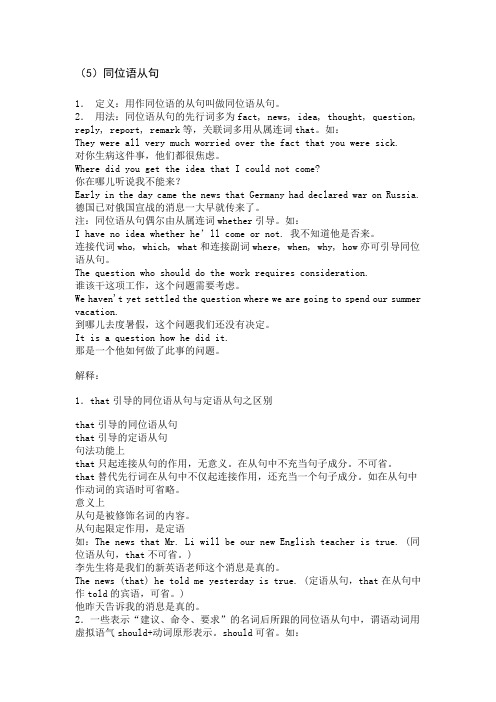
(5)同位语从句1.定义:用作同位语的从句叫做同位语从句。
2.用法:同位语从句的先行词多为fact, news, idea, thought, question, reply, report, remark等,关联词多用从属连词that。
如:They were all very much worried over the fact that you were sick.对你生病这件事,他们都很焦虑。
Where did you get the idea that I could not come?你在哪儿听说我不能来?Early in the day came the news that Germany had declared war on Russia. 德国已对俄国宣战的消息一大早就传来了。
注:同位语从句偶尔由从属连词whether引导。
如:I have no idea whether he’ll come or not. 我不知道他是否来。
连接代词who, which, what和连接副词where, when, why, how亦可引导同位语从句。
The question who should do the work requires consideration.谁该干这项工作,这个问题需要考虑。
We haven't yet settled the question where we are going to spend our summer vacation.到哪儿去度暑假,这个问题我们还没有决定。
It is a question how he did it.那是一个他如何做了此事的问题。
解释:1.that引导的同位语从句与定语从句之区别that引导的同位语从句that引导的定语从句句法功能上that只起连接从句的作用,无意义。
在从句中不充当句子成分。
不可省。
that替代先行词在从句中不仅起连接作用,还充当一个句子成分。
同位语从句

同位语从句
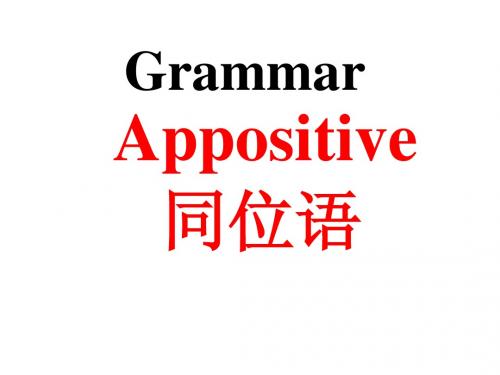
实战演习: 1. His central idea is ____ the losers do not write history. A. X C. that exam. A. that B. this is C. it D. what’s B. because D. whether
2. I think ___ certain that she will do well in her
Grammar
Appositive 同位语
•P14 Part 2
• 1.同位语从句一般跟在某些名词后面, 如: news,idea,fact,promise, question,doubt,thought,hope, message,suggestion,word(消息), possibility等用以说明或解释该名词的 具体内容。如: • I heard the news that our team had won. • 我听到了我们队获胜的消息。 • I had no idea that you were here. • 我不知道你在这里。
6. We’ve just heard a warning on the radio that _______ a hurricane is likely to come.
that 7. There is no doubt _____ he has told a lie. how 8. You have no idea ______ anxious I was! where 9. The coat is in the place _____ you left it.
5. I have no idea ___ he will start. A A. when B. that C. what D. / 6. I’ve come from the government with a B message ___ the meeting won’t be held tomorrow. A. if B. that C. whether D. which D 7. The thought ____ he might fail in the exam worried him. A. when B. which C. what D. that C 8. The order ___ the prisoner be set free arrived too late. A. which B. whether C. that D. what
(完整版)同位语从句

同位语从句1.什么是同位语从句?在主从复合句中作同位语的从句称为同位语从句,常放在fact, news, idea, truth, hope, problem, information, wish,promise, answer, evidence, report, explanation, suggestion, conclusion等抽象名词后面,说明该名词的具体内容。
换言之,同位语从句和所修饰的名词在内容上为同一关系,对其内容作进一步说明。
例:The news that they had won the game soon spread over the whole school.他们比赛获胜的消息很快传遍了整个学校。
析:they had won the game说明The news的全部内容,因此该句为同位语从句。
2.引导词有哪些?怎么用?同位语从句一般用that, whether,what, which, who, when, where, why, how等词引导。
补充:when,where和why引导的定语从句和同位语从句之区别:when,where和why作关系副词引导定语从句时,有跟它们含义相应的先行词,且先行词在从句中充当一定成分。
当when,where和why作连接副词引导同位语从句时,则没有与它们含义相应的先行词。
所以,只要看先行词就可以判定了,若先行词和引导词关系密切,就是定从;只是修饰关系,就是同位语从句。
试比较:I'll never forget the day when(=on which)we met for the first time.(定语从句)I have no idea when we met for the first time(同位语从句)The office where(=in which)you work is here.(定语从句)Then arose the question where we were to get so much money.(同位语从句)The reason why(=for which)he did not come is quite clear.(定语从句)Xiao Wang has solved the problem why the TV was out of order.(同位语从句)以上例句中when,where和why作关系副词引导定语从句时,可以改为“介词+关系代词which”来引导;而引导同位语从句的when,where和why就不能这样改。
同位语从句
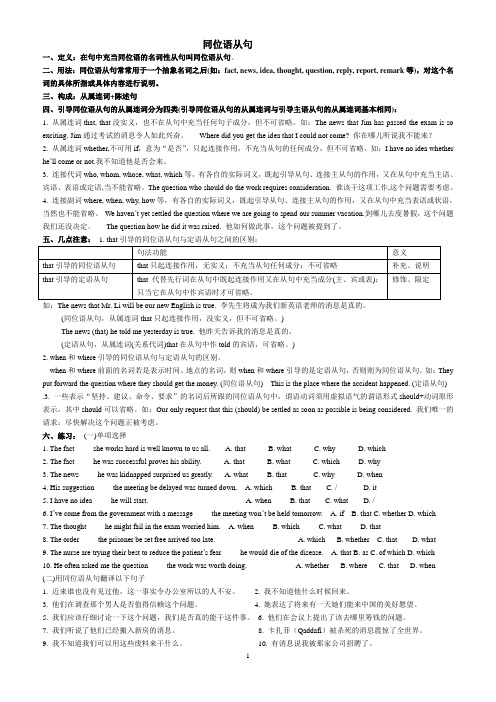
同位语从句一、定义:在句中充当同位语的名词性从句叫同位语从句。
二、用法:同位语从句常常用于一个抽象名词之后(如:fact, news, idea, thought, question, reply, report, remark等),对这个名词的具体所指或具体内容进行说明。
三、构成:从属连词+陈述句四、引导同位语从句的从属连词分为四类(引导同位语从句的从属连词与引导主语从句的从属连词基本相同):1. 从属连词that, that没实义,也不在从句中充当任何句子成分,但不可省略。
如:The news that Jim has passed the exam is so exciting. Jim通过考试的消息令人如此兴奋。
Where did you get the idea that I could not come? 你在哪儿听说我不能来?2. 从属连词whether,不可用if,意为“是否”,只起连接作用,不充当从句的任何成分,但不可省略。
如:I have no idea whether he’ll come or not.我不知道他是否会来。
3. 连接代词who, whom, whose, what, which等,有各自的实际词义,既起引导从句、连接主从句的作用,又在从句中充当主语、宾语、表语或定语,当不能省略。
The question who should do the work requires consideration. 谁该干这项工作,这个问题需要考虑。
4. 连接副词where, when, why, how等,有各自的实际词义,既起引导从句、连接主从句的作用,又在从句中充当表语或状语,当然也不能省略。
We haven’t yet settled the question where we are going to spend our summer vacation.到哪儿去度暑假,这个问题我们还没决定。
什么是同位语从句
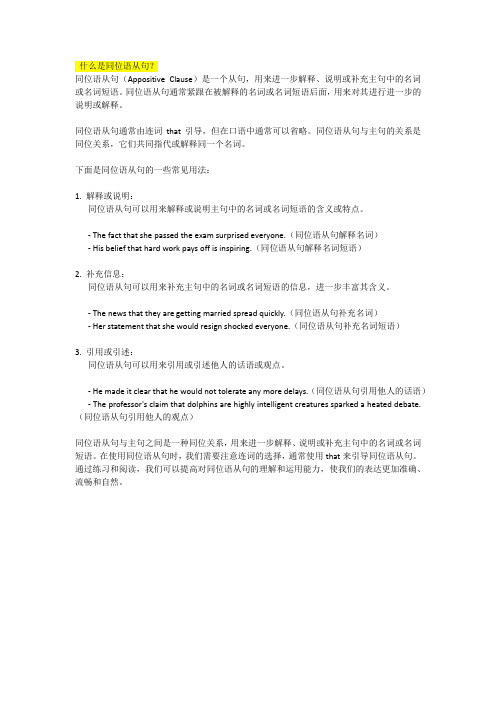
什么是同位语从句?同位语从句(Appositive Clause)是一个从句,用来进一步解释、说明或补充主句中的名词或名词短语。
同位语从句通常紧跟在被解释的名词或名词短语后面,用来对其进行进一步的说明或解释。
同位语从句通常由连词that引导,但在口语中通常可以省略。
同位语从句与主句的关系是同位关系,它们共同指代或解释同一个名词。
下面是同位语从句的一些常见用法:1. 解释或说明:同位语从句可以用来解释或说明主句中的名词或名词短语的含义或特点。
- The fact that she passed the exam surprised everyone.(同位语从句解释名词)- His belief that hard work pays off is inspiring.(同位语从句解释名词短语)2. 补充信息:同位语从句可以用来补充主句中的名词或名词短语的信息,进一步丰富其含义。
- The news that they are getting married spread quickly.(同位语从句补充名词)- Her statement that she would resign shocked everyone.(同位语从句补充名词短语)3. 引用或引述:同位语从句可以用来引用或引述他人的话语或观点。
- He made it clear that he would not tolerate any more delays.(同位语从句引用他人的话语)- The professor's claim that dolphins are highly intelligent creatures sparked a heated debate.(同位语从句引用他人的观点)同位语从句与主句之间是一种同位关系,用来进一步解释、说明或补充主句中的名词或名词短语。
在使用同位语从句时,我们需要注意连词的选择,通常使用that来引导同位语从句。
什么是同位语从句
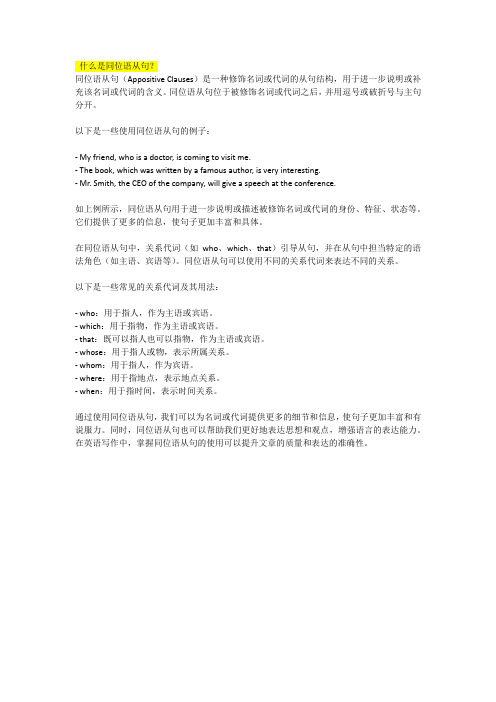
什么是同位语从句?同位语从句(Appositive Clauses)是一种修饰名词或代词的从句结构,用于进一步说明或补充该名词或代词的含义。
同位语从句位于被修饰名词或代词之后,并用逗号或破折号与主句分开。
以下是一些使用同位语从句的例子:- My friend, who is a doctor, is coming to visit me.- The book, which was written by a famous author, is very interesting.- Mr. Smith, the CEO of the company, will give a speech at the conference.如上例所示,同位语从句用于进一步说明或描述被修饰名词或代词的身份、特征、状态等。
它们提供了更多的信息,使句子更加丰富和具体。
在同位语从句中,关系代词(如who、which、that)引导从句,并在从句中担当特定的语法角色(如主语、宾语等)。
同位语从句可以使用不同的关系代词来表达不同的关系。
以下是一些常见的关系代词及其用法:- who:用于指人,作为主语或宾语。
- which:用于指物,作为主语或宾语。
- that:既可以指人也可以指物,作为主语或宾语。
- whose:用于指人或物,表示所属关系。
- whom:用于指人,作为宾语。
- where:用于指地点,表示地点关系。
- when:用于指时间,表示时间关系。
通过使用同位语从句,我们可以为名词或代词提供更多的细节和信息,使句子更加丰富和有说服力。
同时,同位语从句也可以帮助我们更好地表达思想和观点,增强语言的表达能力。
在英语写作中,掌握同位语从句的使用可以提升文章的质量和表达的准确性。
高考-同位语从句
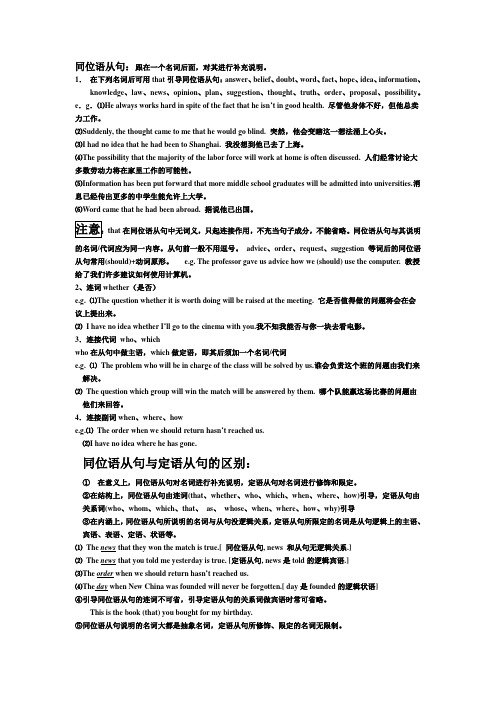
同位语从句:跟在一个名词后面,对其进行补充说明。
1.在下列名词后可用that引导同位语从句:answer、belief、doubt、word、fact、hope、idea、information、knowledge、law、news、opinion、p lan、suggestion、thought、truth、order、proposal、possibility。
e.g.⑴He always works hard in spite of the fact that he isn’t in good health. 尽管他身体不好,但他总卖力工作。
⑵Suddenly, the thought came to me that he would go blind. 突然,他会变瞎这一想法涌上心头。
⑶I had no idea that he had been to Shanghai. 我没想到他已去了上海。
⑷The possibility that the majority of the labor force will work at home is often discussed. 人们经常讨论大多数劳动力将在家里工作的可能性。
⑸Information has been put forward that more middle school graduates will be admitted into universities.消息已经传出更多的中学生能允许上大学。
⑹W ord came that he had been abroad. 据说他已出国。
that在同位语从句中无词义,只起连接作用,不充当句子成分,不能省略。
同位语从句与其说明的名词/代词应为同一内容。
从句前一般不用逗号。
advice、order、request、suggestion 等词后的同位语从句常用(should)+动词原形。
同位语从句例句50例_学习总结_

同位语从句例句50例_学习总结_同位语从句例句同位语从句例句(一):1、由whether引导的同位语例句:We are not investigating the question whether he is trustworthy。
我们不是在调查他是否能够信任的问题。
【注意】whether 可引导同位语从句,但if不能引导同位语从句。
2、由that引导的同位语例句:He referred to Copernicus statement that the earth moves round the sun。
他提到了哥白尼关于地球绕太阳转的说法。
【注意1】在某些名词(如demand,wish,suggestion,resolution等)后面的同位语从句要用虚拟语气。
如:They expressed the wish that she accept the award。
他们表示期望她理解这笔奖金。
【注意2】引导同位语从句的连词that通常不省略,但在非正式文体中也能够省去。
如:He gabbed his suitcase and gave the impression he was boarding the Tokyo plane。
他拿起了手提箱,给人的印象是他要登上飞往东京的飞机了。
3、由连接副词引导的同位语例句:I have no idea when he will e back。
我不明白他什么时候回来。
4、由连接代词引导的同位语例句:Have you any idea what time it starts? 你明白什么时候开始吗?5、关于分离同位语从句有时同位语从句能够和同位的名词分开。
例句:The news got about that he had won a car in the lottery。
消息传开说他中彩得了一辆汽车。
同位语从句例句(二):1。
由that引导1、We heard the news that our team had won。
同位语从句
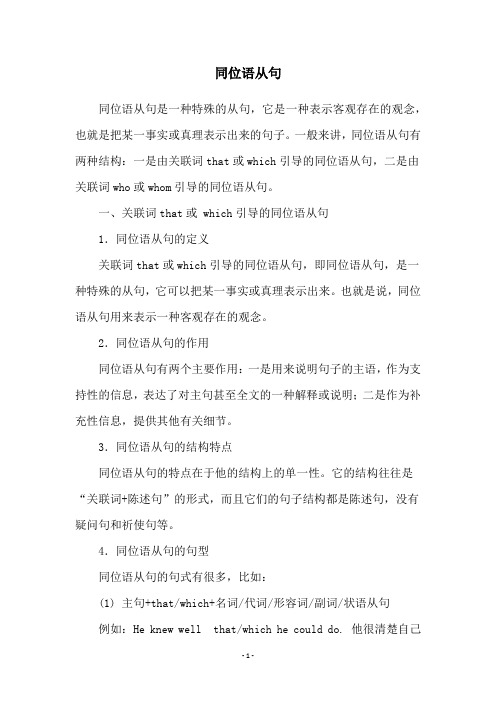
同位语从句同位语从句是一种特殊的从句,它是一种表示客观存在的观念,也就是把某一事实或真理表示出来的句子。
一般来讲,同位语从句有两种结构:一是由关联词that或which引导的同位语从句,二是由关联词who或whom引导的同位语从句。
一、关联词that或 which引导的同位语从句1.同位语从句的定义关联词that或which引导的同位语从句,即同位语从句,是一种特殊的从句,它可以把某一事实或真理表示出来。
也就是说,同位语从句用来表示一种客观存在的观念。
2.同位语从句的作用同位语从句有两个主要作用:一是用来说明句子的主语,作为支持性的信息,表达了对主句甚至全文的一种解释或说明;二是作为补充性信息,提供其他有关细节。
3.同位语从句的结构特点同位语从句的特点在于他的结构上的单一性。
它的结构往往是“关联词+陈述句”的形式,而且它们的句子结构都是陈述句,没有疑问句和祈使句等。
4.同位语从句的句型同位语从句的句式有很多,比如:(1) 主句+that/which+名词/代词/形容词/副词/状语从句例如:He knew well that/which he could do. 他很清楚自己能做什么。
(2) 主句+that/which+从句例如:It is clear that/which they are wrong. 他们是错的这一点很清楚。
二、关联词who或whom引导的同位语从句1.同位语从句的定义关联词who或whom引导的同位语从句,也就是同位语从句,是一种特殊的从句,它表示客观存在的观念,也就是把某一事实或真理表示出来的句子。
2.同位语从句的作用相对于that或which引导的同位语从句而言,who或whom引导的同位语从句主要用于引出人物或实体,对一句话中的人物或事物有更深入的认识和说明。
3.同位语从句的结构特点同位语从句的特点在于它的句子结构是陈述句,没有疑问句和祈使句等,而它们的结构往往是“关联词+陈述句”的形式。
同位语从句
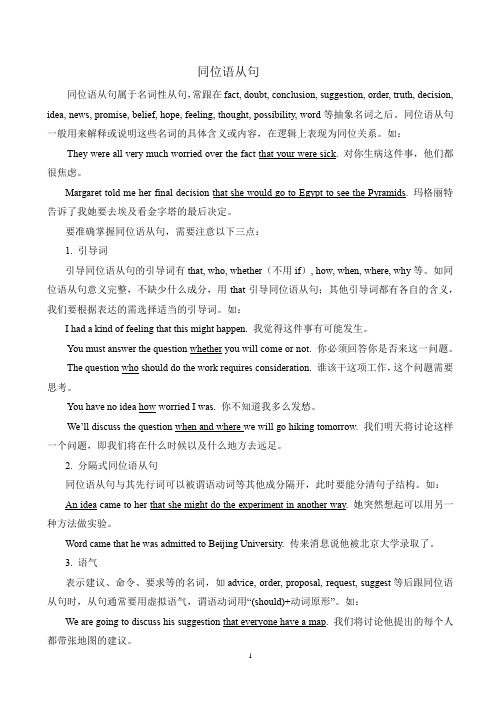
同位语从句同位语从句属于名词性从句,常跟在fact, doubt, conclusion, suggestion, order, truth, decision, idea, news, promise, belief, hope, feeling, thought, possibility, word等抽象名词之后。
同位语从句一般用来解释或说明这些名词的具体含义或内容,在逻辑上表现为同位关系。
如:They were all very much worried over the fact that your were sick. 对你生病这件事,他们都很焦虑。
Margaret told me her final decision that she would go to Egypt to see the Pyramids. 玛格丽特告诉了我她要去埃及看金字塔的最后决定。
要准确掌握同位语从句,需要注意以下三点:1. 引导词引导同位语从句的引导词有that, who, whether(不用if), how, when, where, why等。
如同位语从句意义完整,不缺少什么成分,用that引导同位语从句;其他引导词都有各自的含义,我们要根据表达的需选择适当的引导词。
如:I had a kind of feeling that this might happen. 我觉得这件事有可能发生。
You must answer the question whether you will come or not. 你必须回答你是否来这一问题。
The question who should do the work requires consideration. 谁该干这项工作,这个问题需要思考。
You have no idea how worried I was. 你不知道我多么发愁。
We’ll discuss the question when and where we will go hiking tomorrow. 我们明天将讨论这样一个问题,即我们将在什么时候以及什么地方去远足。
同位语从句
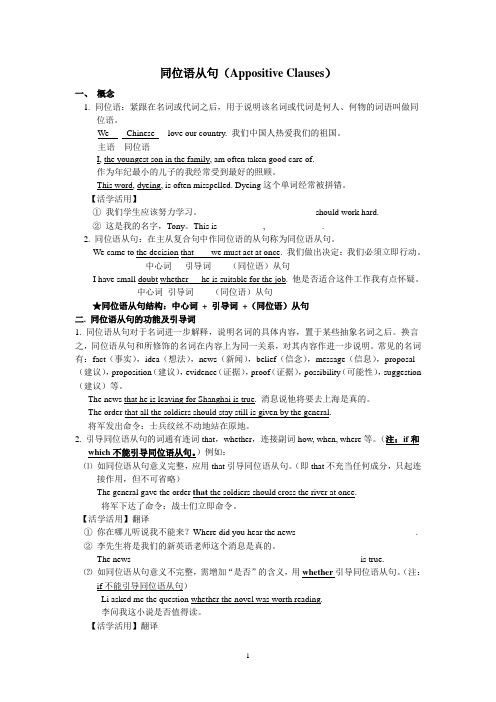
同位语从句(Appositive Clauses)一、概念1. 同位语:紧跟在名词或代词之后,用于说明该名词或代词是何人、何物的词语叫做同位语。
We Chinese love our country. 我们中国人热爱我们的祖国。
主语同位语I, the youngest son in the family, am often taken good care of.作为年纪最小的儿子的我经常受到最好的照顾。
This word, dyeing, is often misspelled. Dyeing这个单词经常被拼错。
【活学活用】①我们学生应该努力学习。
__________________________should work hard.②这是我的名字,Tony。
This is __________,_____________.2. 同位语从句:在主从复合句中作同位语的从句称为同位语从句。
We came to the decision that we must act at once. 我们做出决定:我们必须立即行动。
中心词引导词(同位语)从句I have small doubt whether he is suitable for the job. 他是否适合这件工作我有点怀疑。
中心词引导词(同位语)从句★同位语从句结构:中心词+ 引导词+(同位语)从句二. 同位语从句的功能及引导词1. 同位语从句对于名词进一步解释,说明名词的具体内容,置于某些抽象名词之后。
换言之,同位语从句和所修饰的名词在内容上为同一关系,对其内容作进一步说明。
常见的名词有:fact(事实),idea(想法),news(新闻),belief(信念),message(信息),proposal (建议),proposition(建议),evidence(证据),proof(证据),possibility(可能性),suggestion (建议)等。
完整版)同位语从句

完整版)同位语从句是同位语从句?同位语从句是在主从复合句中作同位语的从句。
它通常放在抽象名词后面,如fact、news、idea、truth、hope、problem、n、wish、promise、answer、evidence、report、n、n、n等,用来说明该名词的具体内容。
同位语从句和所修饰的名词在内容上为同一关系,对其内容作进一步说明。
例如,句子“The news that they had won the game soon spread over the whole school.”中,“they had won the game”说明了“The news”的全部内容,因此该句为同位语从句。
同位语从句的引导词有哪些?同位语从句一般用that、whether、what、which、who、when、where、why、how等词引导。
其中,that只起连接作用,不充当任何成分,不可省略。
而whether、what、how虽然不能引导定语从句,但可以用在同位语从句中。
例如,句子“We'll discuss the problem whether the sports m eeting will be held on time.”中,“whether”引导了同位语从句,增加了“是否”的含义,表达了“the problem”的全部内容。
另外,引导词还要根据从句的意义进行选择,如增加“什么”、“谁”、“什么时候”、“什么地点”、“什么方式”等含义。
例如,句子“I have no idea what he is doing now.”中,“what”引导了同位语从句,增加了“什么”的含义,表达了“I”对于“he is doing”的不了解。
句子“The n who should d o the work requires XXX.”中,“who”引导了同位语从句,增加了“谁”的含义,表达了“the n”的全部内容。
同位语从句
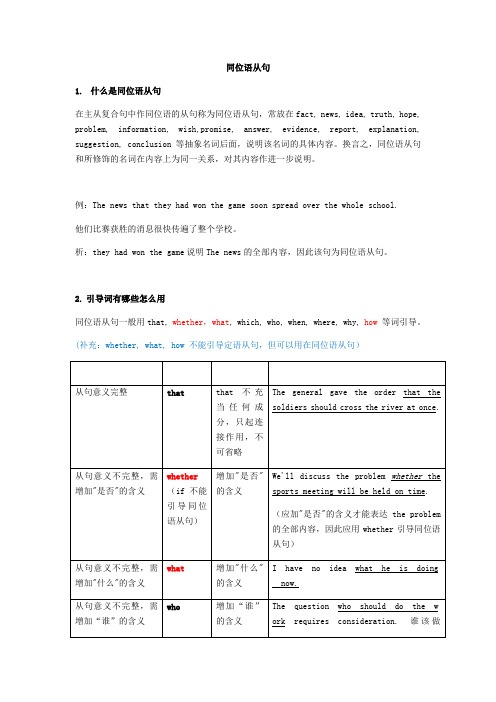
同位语从句1.什么是同位语从句在主从复合句中作同位语的从句称为同位语从句,常放在fact, news, idea, truth, hope, problem, information, wish,promise, answer, evidence, report, explanation, suggestion, conclusion等抽象名词后面,说明该名词的具体内容。
换言之,同位语从句和所修饰的名词在内容上为同一关系,对其内容作进一步说明。
例:The news that they had won the game soon spread over the whole school.他们比赛获胜的消息很快传遍了整个学校。
析:they had won the game说明The news的全部内容,因此该句为同位语从句。
2.引导词有哪些怎么用同位语从句一般用that, whether,what, which, who, when, where, why, how等词引导。
(补充:whether, what, how 不能引导定语从句,但可以用在同位语从句)补充:when,where 和why 引导的定语从句和同位语从句之区别:when , where 和why 作关系副词引导定语从句时,有跟它们含义相应的先行词,且先行词在从句中充当一定成分。
当when , where 和why作连接副词引导同位语从句时,则没有与它们含义相应的先行词。
所以,只要看先行词就可以判定了,若先行词和引导词关系密切,就是定从;只是修饰关系,就是同位语从句。
试比较:I'll never forget the day when ( = on which ) we met for the fir st time . ( 定语从句)I have no idea when we met for the first time ( 同位语从句)The office where ( = in which ) you work is here . ( 定语从句)Then arose the question where we were to get so much money . ( 同位语从句)The reason why ( = for which ) he did not come is quite clear . ( 定语从句)Xiao Wang has solved the problem why the TV was out of order . ( 同位语从句)以上例句中when , where 和why 作关系副词引导定语从句时,可以改为“介词+ 关系代词which”来引导;而引导同位语从句的when , where 和why 就不能这样改。
- 1、下载文档前请自行甄别文档内容的完整性,平台不提供额外的编辑、内容补充、找答案等附加服务。
- 2、"仅部分预览"的文档,不可在线预览部分如存在完整性等问题,可反馈申请退款(可完整预览的文档不适用该条件!)。
- 3、如文档侵犯您的权益,请联系客服反馈,我们会尽快为您处理(人工客服工作时间:9:00-18:30)。
同位语从句
1.什么是同位语从句?
在主从复合句中作同位语的从句称为同位语从句,常放在fact, news, idea, truth, hope, problem, information, wish,promise, answer, evidence, report, explanation, suggestion, conclusion等抽象名词后面,说明该名词的具体内容。
换言之,同位语从句和所修饰的名词在内容上为同一关系,对其内容作进一步说明。
例:The news that they had won the game soon spread over the whole school.
他们比赛获胜的消息很快传遍了整个学校。
析:they had won the game说明The news的全部内容,因此该句为同位语从句。
2.引导词有哪些?怎么用?
同位语从句一般用that, whether,what, which, who, when, where, why, how等词引导。
补充:
when,where和why引导的定语从句和同位语从句之区别:
when,where和why作关系副词引导定语从句时,有跟它们含义相应的先行词,且先行词在从句中充当一定成分。
当when,where和why作连接副词引导同位语从句时,则没有与它
们含义相应的先行词。
所以,只要看先行词就可以判定了,若先行词和引导词关系密切,就是定从;只是修饰关系,就是同位语从句。
试比较:
I'll never forget the day when(=on which)we met for the first time.(定语从句)
I have no idea when we met for the first time(同位语从句)
The office where(=in which)you work is here.(定语从句)
Then arose the question where we were to get so much money.(同位语从句)
The reason why(=for which)he did not come is quite clear.(定语从句)
Xiao Wang has solved the problem why the TV was out of order.(同位语从句)
以上例句中when,where和why作关系副词引导定语从句时,可以改为“介词+关系代词which”来引导;而引导同位语从句的when,where和why就不能这样改。
由此可知,why引导的若是同位语从句,先行词就不会是reason或其同义词;若是reason 或其同义词作先行词,就一定是定语从句。
所以,只要看先行词就可以判定了。
同位语从句前面的名词只能是idea, fact, news, hope, belief, suggestion, proposal, word, thought, doubt, truth, possibility, promise, order等有一定内涵的名词;而定语从句的先行词可以是名词、代词,主句的一部分或是整个主句。
如:
The possibility that the majority of the labour force will work at home is often discussed. (同位语从句)
We are not looking into the question whether he is worth trusting.(同位语从句)
Word came that he had been abroad.(同位语从句)
Our team has won the game, which made us very happy.(定语从句)
The doctor whom you are looking for is in the room.(定语从句)
His mother did all she could to help him with his study.(定语从句,代词all作先行词)
2. 从性质上区别
定语从句是从句对其先行词的修饰或限制,属于形容词性从句的范畴;而同位语从句是从句对前面抽象名词的进一步的说明和解释,属于名词性从句的范畴。
如:
The news that our team has won the game was true.(同位语从句,补充说明news到底是一个什么消息.)
The news that he told me yesterday was true.(定语从句,news在从句中作told的宾语)
I made a promise that if anyone set me free I would make him very rich. (同位语从句,补充说
明promise到底是一个什么诺言.)
The mother made a promise that pleased all her children. (定语从句,promise在从句中作pleased的主语.)
3. 从引导词及其在句子中的成分上区别
有些引导词如how, whether, what可以引导同位语从句,但不能引导定语从句.如:
That question whether we need it has not been considered. (同位语从句)
I have no idea what has happened to him. (同位语从句)
引导词that引导定语从句时,在从句中一般作主语或宾语(指物时还可以用which代替),并且作宾语时常常省略。
that在同位语从句中仅起连接作用,不充当任何成分,并且不能省略,也不能用which来代替。
如:
The order that we should send a few people to help the other groups was received yesterday. (同位语从句,是对order的具体解释,that虽不作成分,但不能省略。
)
The order that we received yesterday was that we should send a few people to help the other groups. (定语从句,是名词order的修饰语,that在从句中作received的宾语,可以省略。
)
补充:
当主句的谓语较短,而同位语从句较长时,同位语从句常后置。
如:The thought came to him that maybe the enemy had fled the city.。
